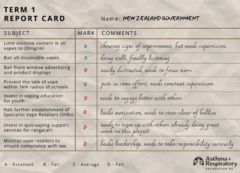Vaping ‘Report Card’ For Government Reveals Average Grades

As thousands of parents comb through their children’s Term 1 report cards, the Asthma and Respiratory Foundation NZ has given the Government its very own.
The Foundation reviewed its vaping regulation recommendations against current laws and policies and found that the Government still has significant areas for improvement to address the youth vaping epidemic.
Foundation Chief Executive Ms Letitia Harding says the government needs to engage with and listen to specialists outside of the Ministry of Health when it comes to vaping and protecting the health and well-being of our rangatahi.
"We’ve just been through a pandemic - protecting lung and heart health should be an absolute priority for the Government.
"1 in 7 Kiwis suffer from a respiratory condition, and 1 in 5 high school students regularly vape, you don’t have to be a mathematician to see that we are on the cusp of a serious future health crisis."
Since 2017 the Foundation has been advocating for evidence-based vaping regulations.
Recommendations included limiting nicotine content in all vapes to 20mg/ml, banning all disposable vapes, banning front-of-window advertising and product displays, preventing the sale of vapes within a 1km radius of schools, investing in vaping education for youth, halting the further establishment of Specialist Vape Retailers (SVRs), and investing in quit-vaping support services for rangatahi.
So how have the last seven years stacked up?
To date, the Government has banned all disposable vapes (although not effective until October 2024) and has restricted the sale of vapes by an SVR within 300 metres of schools and marae. Dairies and supermarkets, however, are not restricted by proximity.
"While we give the Government credit where it is due, it has been slow, and there is still a lot of work to be done," Ms Harding says.
"We need to do more to protect our most vulnerable, our rangatahi, and - at the moment - there seems to be a foot on the brake."
The Foundation often hears stories of children - some as young as six - becoming addicted to vaping, Ms Harding says.
"This is proof that our youth vaping epidemic is not going away anytime soon, so we need to fight to do everything we can to protect the health of our next generation.
"We need commitment from the Government to stop any more SVRs, actually monitor all vape retailers with boots on the ground, and enforce harsher penalties for those retailers who are still flouting the rules."
This Government has an opportunity to make bold immediate moves to help tackle the youth vaping issue, she says.
"But, first, we need them to listen and pay attention to those who have been giving the same evidence-based advice since 2017."


 Public Service Commission: Commissioner To Lead Bargaining With Education Sector
Public Service Commission: Commissioner To Lead Bargaining With Education Sector Athletics New Zealand: 6000 Athletes Set To Tackle Iconic Red Stag Rotorua Marathon
Athletics New Zealand: 6000 Athletes Set To Tackle Iconic Red Stag Rotorua Marathon Hāpai te Hauora: Whānau Stop Smoking For World Smokefree May - That’s Us
Hāpai te Hauora: Whānau Stop Smoking For World Smokefree May - That’s Us Te Wananga o Aotearoa: Mākereti Papakura, The First Indigenous Woman To Study At Oxford, To Be Awarded A Posthumous Degree
Te Wananga o Aotearoa: Mākereti Papakura, The First Indigenous Woman To Study At Oxford, To Be Awarded A Posthumous Degree Race Unity Speech Awards: Students Unite As One - Speaking Up For Unity In Aotearoa - Race Unity Speech Awards And Hui 2025
Race Unity Speech Awards: Students Unite As One - Speaking Up For Unity In Aotearoa - Race Unity Speech Awards And Hui 2025 General Practice Owners Association: Government Focus On Physician Associates A Distraction From Real Issues
General Practice Owners Association: Government Focus On Physician Associates A Distraction From Real Issues